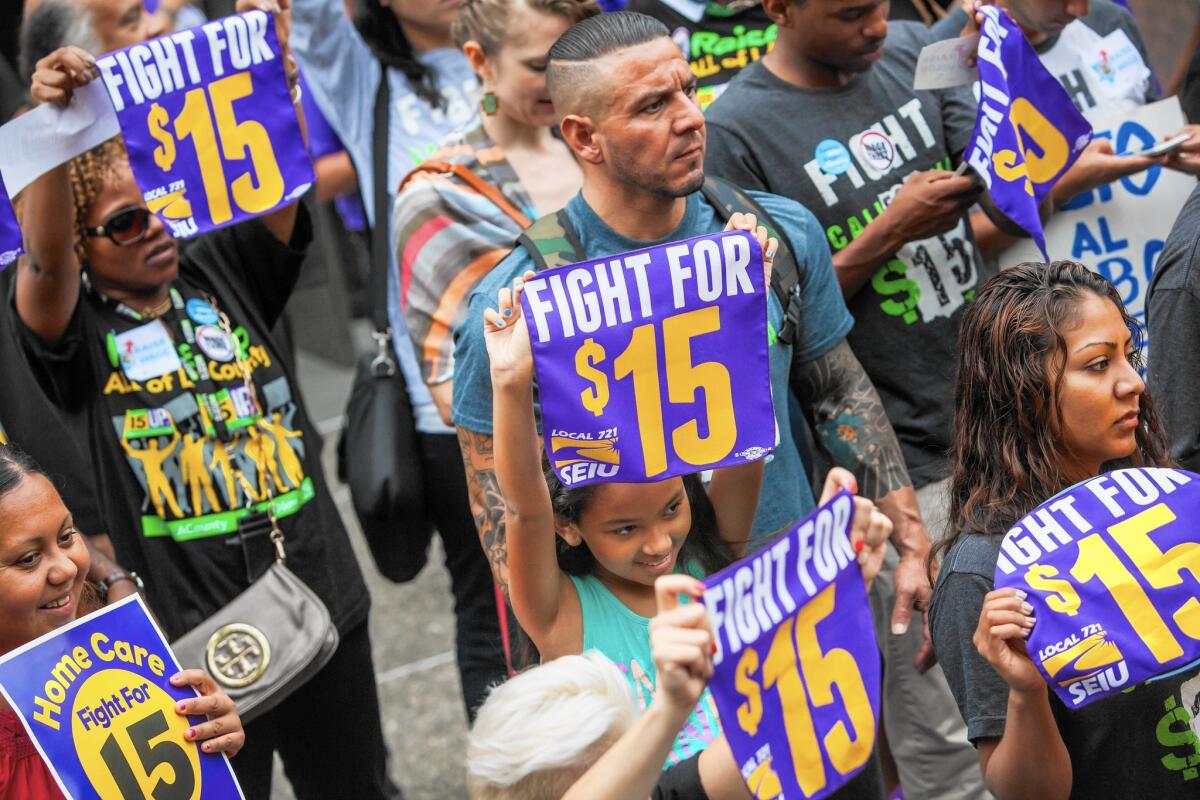Column: Maximizing the higher minimum wage

Low-wage earners packed the Los Angeles County Board of Supervisors meeting, which ended with a vote to raise the minimum wage to $15 an hour by 2021.
They packed the house.
Burger flippers, checkout clerks, housekeepers, home healthcare workers and other folks who move the goods, clean the messes and keep things running, for nickels and dimes, in one of the wealthiest regions on the planet.
They arrived early at the L.A. County Board of Supervisors meeting Tuesday, stood in a long line, and waited patiently to speak their minds on the proposed minimum wage increase.
Roberto Balanzar, a young guy, was the first of the low-wage earners to speak.
“Let’s make history today,” Balanzar said, telling supervisors an increase would be a big boost for the masses.
Supervisors listened to Balanzar and dozens more like him. About four hours after he spoke, they voted 3 to 2 in favor of following the city of Los Angeles’ lead and gradually bumping the minimum wage from $9 to $15 an hour by 2021 in unincorporated areas of the county and for county employees.
After he spoke, and before the vote, I cornered Balanzar to find out more about his situation.
“I make $9 an hour,” said the 20-year-old, a drive-through cashier at a Burger King. He said he attends Long Beach City College and hopes to one day study engineering or marketing at Long Beach State or maybe even UCLA.
So how does a young man live on a couple hundred bucks a week in an area with some of the highest rents and home prices in the country?
“I live in a one-bedroom apartment in Compton,” Balanzar said. “It’s me, my three little brothers and my mom.”
Balanzar said his father lives in Mexico, so he and his mother — who works part time in the catering business — scratch up just enough money to survive. With the help of food stamps. He and one brother sleep in bunk beds set up in the kitchen, the two other brothers share the living room sofa, and their mother gets the bedroom.
Balanzar plans to one day move himself and his family well beyond kitchen bunk beds and food stamps, but as he works his way through school, he said, a boost in pay will be a nice lift for his family.
Supervisor Hilda Solis, one of three supporters of the increase, called the vote “a victory for everyone who believes that anyone working full time should be able to support their family.”
It’s a nice sentiment, as was the supervisors’ vow to crack down on rampant wage theft. And I think the increase is one small step in the right direction, given the fact that the economic resurgence has been enjoyed primarily by those who needed it least.
But the reality is that not all businesses are rolling in dough and some may be forced to cut staff or increase the price of their goods and services, so the supes better follow up on their promise to help those companies transition.
And I worry too that for all the backslapping over the bump in the bottom, few politicians would know the first thing about how to get by on $15 an hour. Yeah, it’s a nice raise, but it’s not coming tomorrow, or next year, and when it does finally roll around, $15 an hour — even with a raise tied to the consumer price index — is still going to amount to a poverty paycheck.
So it’d be nice to move beyond the occasional chatter from pols about rebuilding a middle-class economy. And let’s remember that the problem isn’t just low wages, but low wages combined with ridiculous real estate prices. That means someone needs to take the lead on pumping up the stock of affordable housing, whether through rent control, inclusionary zoning or more public-private partnerships.
Anyone care to carry that flag?
Just before Tuesday’s vote, I hustled up to Silver Lake to meet with someone who knows how tough this economy can be. Joanie Stevenson used to clerk at a video store for $8.25 an hour and figured she’d be able to find something else when the store shut its doors in 2012.
She was wrong. She applied everywhere, but nobody had a paycheck for a woman past 50, except for occasional odd jobs like house painting. She never thought she’d need unemployment, but it kept her alive for a while, and later on, food stamps helped.
In one way, Stevenson was blessed. Her father left her a small stucco house, so she had a roof, even if the place needed work she couldn’t afford to do.
To get from one month to the next, she canceled her house insurance, dropped AAA and became a bargain hunter at the market. Still, she nearly had her power turned off and was late on property tax payments. She prayed she wouldn’t have to sell the house to pay rent somewhere. Once or twice, she even had to ask a friend if she could borrow a few dollars.
“Five bucks,” she said, as if she can’t believe she’d dipped so low.
“My friend said the other day that I’m a really cheap date, because he doesn’t have to bring me flowers or candy,” Stevenson said. “All he has to do is bring me a couple of rolls of toilet paper and I’m good.”
She nearly stopped breathing, though, when she entered a pet shop to get something for her cat and overheard a customer saying she takes her dog somewhere weekly, for massages, at 50 bucks a pop.
“It made my skin crawl,” Stevenson said. “Do you know what I could do with that 50 bucks, lady?”
Finally, three weeks ago, the job drought ended — Stevenson got on with a housekeeping agency. Her first paycheck was only about $20, though, because $150 was subtracted for the vacuum cleaner and cleaning kit she had to buy from the agency.
Her hourly pay?
It’s the magic number this week: $15.
Stevenson applauds the county wage increase, but she thinks it’ll be tough for thousands of workers to have to wait six years to hit that mark.
Even in 2015, she knows she won’t live well on $15 an hour. But she’s back to work after three miserable years in the poverty capital, and feeling OK.
“It’s all good,” she said. “I’m breathing, you know?”
Twitter: @LATstevelopez
More to Read
Start your day right
Sign up for Essential California for news, features and recommendations from the L.A. Times and beyond in your inbox six days a week.
You may occasionally receive promotional content from the Los Angeles Times.







